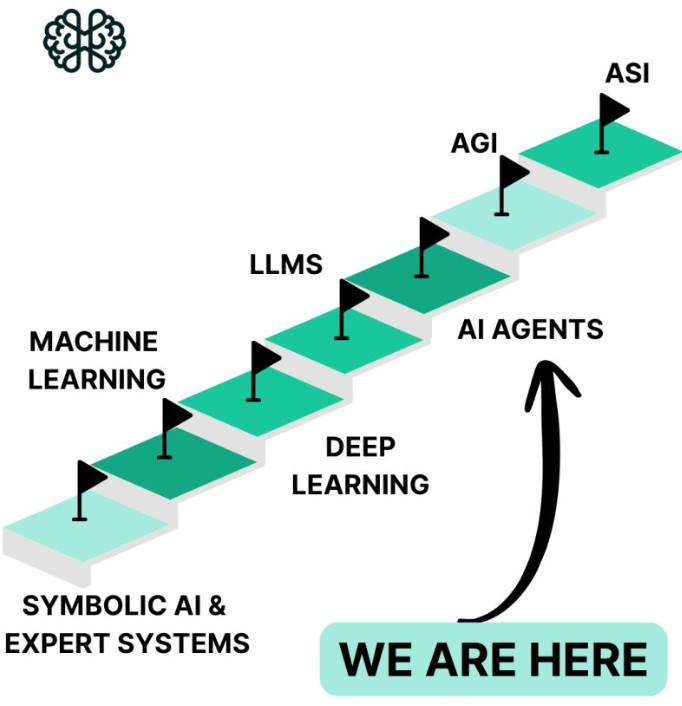
Securing the Future of AI Agents: Why Communication Protocols Matter
Artificial Intelligence (AI) has entered a new era. For decades, AI was about symbolic systems, machine learning, and deep learning models that learned patterns from data. Then came large language models (LLMs), which made it possible for machines to understand and generate human language on a scale. Now we are stepping into the age of AI agents, autonomous, proactive systems that don’t just respond to prompts but can interact with tools, environments, and even other AI agents GenAI Works [1].
Providing secure and structured communication between AI agents is the foundation for what comes next: Artificial General Intelligence (AGI) and beyond. In this new landscape, communication protocols such as the Model Context Protocol (MCP) [2], Agent2Agent (A2A) [3], Agora [4], and the Agent Network Protocol (ANP) [5] are emerging as critical enablers. These protocols define how AI agents talk to each other, invoke tools, and share context.
Why Do AI Agent Protocols Matter?
Without standard protocols, every new tool or data source requires custom integration, authentication, and management. This makes scaling difficult and introduces security risks. Protocols such as MCP and A2A solve this problem by creating a universal communication layer for AI systems.
-
MCP was introduced in 2024 and connects AI agents with external resources and tools in a structured way. It reduces integration complexity but also opens new risks, such as tool poisoning, installer spoofing, and sandbox escapes.
-
A2A was launched in 2025 and enables direct and secure communication between AI agents across organizations. It uses modern standards like OAuth 2.0 and JWT, but challenges remain, including token replay attacks and insufficient granularity of permissions.
-
Agora was designed to solve the” Agent Communication Trilemma” (versatility, efficiency, and portability). It allows agents to negotiate protocols autonomously but faces risks such as protocol document (PD) spoofing and replay vulnerabilities.
-
ANP aims to create a decentralized” Internet of Agents.” It supports interoperability across billions of agents but faces scalability and identity management challenges.
The Security and Privacy Risks
Deploying these protocols expands the attack surface. Threats can be grouped into security risks (integrity, availability, reliability) and privacy risks (data leakage, unauthorized access, lack of transparency)
Some notable threats include:
-
Name collision and naming attacks in MCP.
-
Tool poisoning and malicious installer spoofing in MCP ecosystems.
-
Data leakage across all agent protocols.
-
Weak or limited access control for all the protocols.
Why Securing AI Agent Protocols Matters
Traditional cybersecurity models (confidentiality, integrity, availability) are no longer sufficient. In AI agent ecosystems, we must secure context confidentiality, context integrity, and context availability—protecting the sensitive, dynamic context that agents exchange. This shift requires defense-in-depth strategies, governance mechanisms, and continuous monitoring to ensure that agent ecosystems remain trustworthy.
The Road Ahead
Protocols such as MCP, A2A, Agora, and ANP are laying the groundwork for a secure, interoperable AI ecosystem. But without strong security and privacy foundations, the dream of trustworthy multi-agent systems will be undermined.
The road ahead involves:
-
Designing stricter authentication, authorization, and audit mechanisms.
-
Building privacy-preserving techniques such as anonymization and metadata minimization.
-
Establishing AI governance frameworks to enforce secure development and deployment practices.
The evolution of AI agents is inevitable. Ensuring their communication is secure will be one of the defining challenges of AI security in the coming years. The next wave of AI won’t just be about smarter models; it will be about safer ecosystems. Protocols like MCP, A2A, Agora, and ANP are only the beginning.
Edited By: Windhya Rankothge, PhD, Canadian Institute for Cybersecurity
References
-
GenAI Works. Generative ai vs. llm, artificial intelligence, machine learning, llm [linkedin post], July 2025. The Evolution of AI: From Logic to AGI | Generative AI posted on the topic | LinkedIn
-
Anthropic. Introducing the Model Context Protocol. November 2024. Introducing the Model Context Protocol \ Anthropic
-
Rao Surapaneni, Miku Jha, Michael Vakoc, and Todd Segal. Announcing the agent2agent protocol (a2a). April 2025. https://developers.googleblog.com/en/a2a-a-new-era-of-agent-interoperability/
-
Samuele Marro, Emanuele La Malfa, Jesse Wright, Guohao Li, Nigel Shadbolt, Michael Wooldridge, and Philip Torr. A scalable communication protocol for networks of large language models. arXiv preprint arXiv:2410.11905, 2024. https://arxiv.org/abs/2410.11905
-
Gaowei Chang, Eidan Lin, Chengxuan Yuan, Rizhao Cai, Binbin Chen, Xuan Xie, and Yin Zhang. Agent network protocol technical white paper. arXiv preprint arXiv:2508.00007, 2025. https://arxiv.org/abs/2508.00007